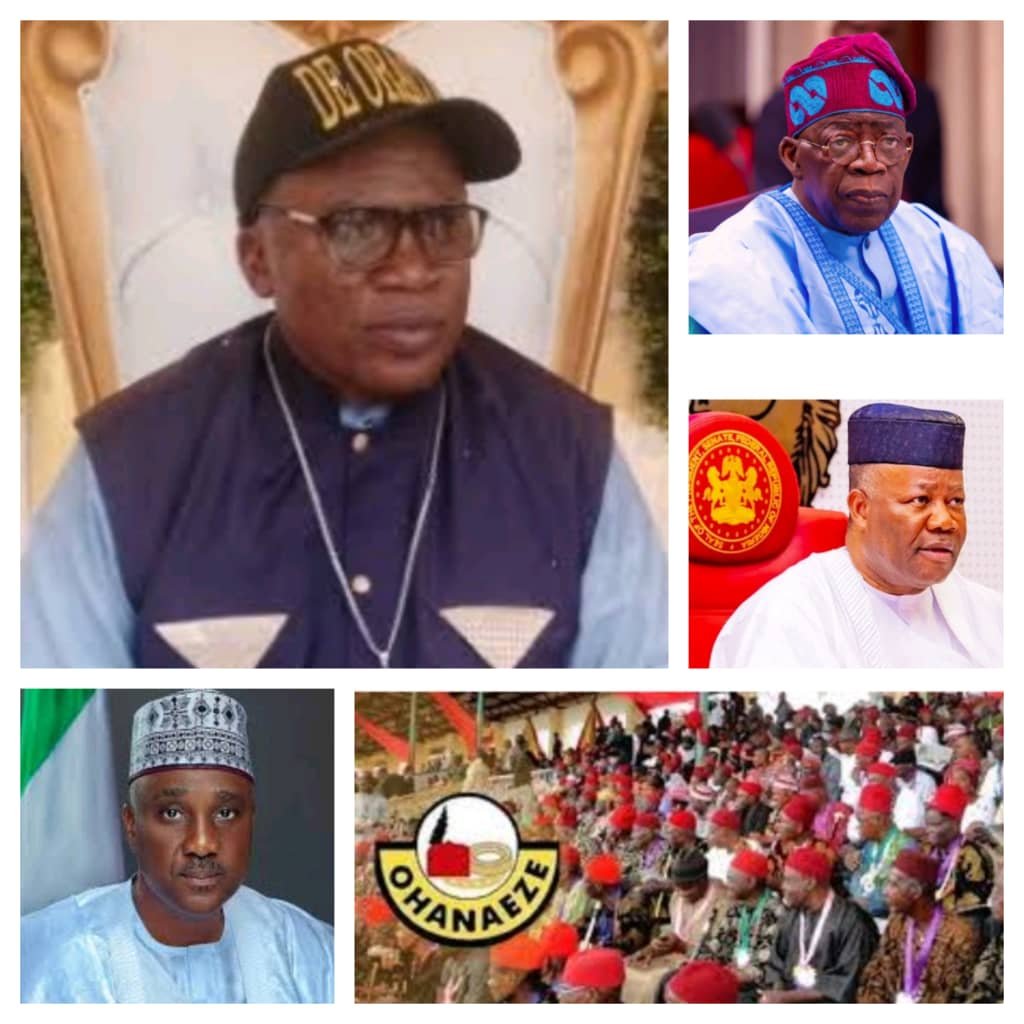Preamble: A Cry for Justice in a Nation at Crossroads
Nigeria today stands at a critical threshold. Sixty-four years after independence, the promise of nationhood still appears elusive, particularly for the Igbo of the South East. The dream of “one Nigeria”, a nation built on unity in diversity, on fairness and justice for all its peoples, has been repeatedly punctured by policies and practices that leave the South East excluded, diminished, and alienated.

It is against this backdrop that we, the South East Mandate for Good Governance, led by our Convener, Bishop Prof. Emeka Nwankpa – Accord Party governorship candidate in the 2023 general election and Grand Patron of Ohaneze Ndi Igbo Youth Wing – submit this petition to President Bola Ahmed Tinubu and the leadership of the National Assembly.
We write with a deep sense of duty, not merely as agitators for regional advantage, but as citizens determined to see Nigeria live up to its constitutional ideals. The Igbo do not seek privilege. We ask only equity, fairness, and inclusion, the very foundations upon which this nation claims legitimacy.
Historical Context: From Pillar to Periphery
The South East is not a fringe participant in the Nigerian project. The Igbo are one of Nigeria’s three major ethnic groups, alongside the Hausa-Fulani and Yoruba. From the independence struggle to the founding of the federation, the Igbo have played leading roles. Figures like Dr. Nnamdi Azikiwe, Nigeria’s first President, helped birth the dream of a united, independent nation. Igbo engineers, traders, and professionals continue to drive national commerce, industry, and education.
Yet, paradoxically, the South East has moved from being a pillar of Nigeria’s foundation to its most marginalised region. The civil war (1967–1970) left scars that have never fully healed. Post-war policies such as the “twenty pounds policy,” abandoned property disputes, and discriminatory federal investments entrenched the feeling of second-class citizenship. Decades later, the wounds remain fresh as federal allocation of resources, appointments, infrastructure, and state creation continue to sideline the region.
This petition, therefore, is not a complaint born of envy, but a cry rooted in history. If Nigeria is truly one nation, then no part of it should perpetually remain at the margins.
The Core Imbalances
We now highlight specific areas where marginalisation is most evident. These imbalances are not abstract numbers. They translate into missed opportunities, stunted development, broken roads, underfunded schools, neglected industries, and a generation of alienated youths.
- Educational Inequities
Education is the bedrock of national progress. Yet, in the distribution of federal universities, the South East consistently comes last.
Federal Universities: Out of 62 federal universities in Nigeria, the South East has only 8, the lowest in the federation. The North West boasts 17, the South West 13, the South South 13, North Central 12, and North East 9.
Other Institutions: The disparity is repeated in federal polytechnics, colleges of education, and unity schools. The South East is always at the bottom of the list.
The implications are devastating. Limited federal institutions mean fewer admission slots for South East students. It means overcrowding in the few existing institutions, forcing parents to seek alternatives at high costs. It perpetuates a cycle where bright young Igbo minds are denied the same opportunities available to their peers in other regions.
Nigeria claims education is a right, yet by starving the South East of institutions, the government effectively denies that right.
- Fewer States, Fewer Voices
Nigeria’s federation is unevenly structured. The South East is the only geopolitical zone with five states. The North West has seven; other zones have six.
This disparity ripples across the entire governance structure:
In the Senate, each state contributes three senators. With five states, the South East has only 15 senators, compared to 21 from the North West and 18 from most other zones.
In the House of Representatives, fewer states translate to fewer constituencies and therefore fewer lawmakers.
In the Federal Executive Council, state representation is constitutionally tied to the number of states. With only five slots, the South East has fewer voices at the table.
In fiscal allocation, revenue distribution formulae that depend on state count leave the South East short-changed.
The absence of an additional state has, for decades, denied the Igbo equal participation in national decision-making. It is an imbalance crying for urgent correction.
- Exclusion from Top Political Offices
The hierarchy of Nigeria’s political power is glaringly lopsided against the Igbo. As of today:
South West controls the Presidency (No. 1).
North East holds the Vice Presidency (No. 2).
South South produces the Senate Presidency (No. 3).
South West occupies the Chief Justice of Nigeria (No. 4).
North West controls the Speakership of the House of Representatives (No. 5).
North Central has the Secretary to the Government of the Federation (No. 6).
The highest-ranking Igbo office is that of Deputy Speaker of the House of Representatives: No. 6 in protocol.
A people who form one of Nigeria’s three foundational ethnic groups cannot be consigned to perpetual political subordination. Representation at the apex of governance is not a favour but a constitutional necessity for balance.
- Infrastructure Deficit
Travel across the South East and the neglect is undeniable. Federal roads, the lifelines of trade and mobility, are in ruins:
The Enugu–Port Harcourt Expressway is riddled with craters.
The Enugu–Onitsha Expressway is nearly impassable.
The Aba–Ikot Ekpene Road has become a death trap.
Beyond the Second Niger Bridge, which itself took decades of agitation before completion, the South East has no landmark federal project comparable to those in other zones. Federal industries are scarce, industrial parks underfunded, and federal medical centres underdeveloped.
Infrastructure is the skeleton of development. By starving the South East, the government weakens Nigeria’s entire body.
- Security: Militarisation Without Development
The security situation in the South East has worsened in recent years. Criminality, separatist agitation, and community unrest have increased. Instead of addressing root causes, the federal response has been militarisation — checkpoints, armed patrols, and sometimes heavy-handed crackdowns.
This approach ignores the fact that insecurity thrives where unemployment, underdevelopment, and alienation prevail. South East youths are among Nigeria’s most industrious, but without jobs, frustration festers. Rather than guns, what the region needs are factories, technology hubs, vocational training centres, and deliberate policies that channel youthful energy into nation-building.
- Economic Neglect
The South East is Nigeria’s entrepreneurial powerhouse.
Onitsha Market, the largest in West Africa, drives commerce across the sub-region.
Aba’s leather and textile industries sustain small businesses nationwide.
Nnewi, known as Nigeria’s Japan, produces auto parts and machinery.
Despite this, federal support is negligible. Oil and gas deposits in Anambra and Imo States remain underdeveloped. Industrialisation projects are scarce. Federal agencies that support trade and industry are disproportionately absent.
The irony is painful: the South East sustains Nigeria’s commerce but receives little in return.
- Railway and Aviation Disparities
Modern transport is key to development. Yet federal railway projects have largely bypassed the South East.
The Abuja–Kaduna, Lagos–Ibadan, and Kano–Maradi lines show heavy investment in other zones.
The South East has only the Port Harcourt–Aba line — inadequate for the region’s commercial capacity.
In aviation, the Akanu Ibiam International Airport, Enugu, remains underfunded and underdeveloped compared to Lagos, Abuja, Kano, and Port Harcourt. This denies the region both accessibility and prestige.
- Federal Appointments
Representation in federal appointments continues the pattern of exclusion.
Recent figures show:
North West: 36
South West: 29
North Central: 25
North East: 24
South South: 22
South East: 16
Appointments determine policy influence, access to resources, and visibility. The South East’s paltry share is not only unfair but strategically dangerous, as it deepens the feeling of alienation.
- Census Appointees and Representation
The census is one of the most consequential exercises in any nation. It shapes legislative representation, resource allocation, electoral boundaries, and access to essential services.
Yet, in the recent unveiling of eight key census appointees, five came from the South West, three from the North, and none from the South East.
This exclusion cannot be dismissed as oversight. It is a calculated silence that threatens to erase the South East’s presence in the very data that defines national identity.
Consequences of Continued Marginalisation
If left unaddressed, these imbalances will deepen alienation, fuel separatist agitations, and weaken Nigeria’s fragile unity. A nation that excludes one of its three pillars cannot survive long.
Marginalisation is not only unjust; it is unsustainable. Unity built on inequality is a house built on sand.
Our Demands
We therefore call on the President of the Federal Republic of Nigeria and the National Assembly to:
- Ensure equitable distribution of federal universities, polytechnics, and unity schools across all zones.
- Create an additional state in the South East to bring the zone at par with others.
- Guarantee fair inclusion of Igbo leaders in top national offices to reflect true federal character.
- Fund and operationalise the South East Development Commission, empowering it to deliver transformative projects.
- Invest massively in infrastructure: roads, railways, airports, and industrial parks.
- Develop oil and gas resources in Anambra and Imo States, alongside support for the region’s entrepreneurial hubs.
- Prioritise job creation for South East youths, linking education to employment.
- Review federal appointments to reflect true inclusivity.
- Reconstitute census leadership to include South East representatives.
Conclusion: Equity as the Bedrock of Unity
Nigeria cannot claim to be a true federation while one of its major ethnic groups remains perpetually marginalised. The Igbo are not asking for handouts. We seek equity, fairness, and justice.
A nation that ignores the cry of one of its pillars endangers its survival. Addressing these imbalances is not a favour to the South East; it is an investment in Nigeria’s unity.
We therefore urge Your Excellencies to rise above politics and act in the spirit of statesmanship. Let history record that under your leadership, Nigeria took bold steps to heal old wounds, correct injustices, and finally give every citizen, regardless of geography, a true sense of belonging.
Only then can we build a Nigeria that is not just a federation in name, but in truth.
Signed
Bishop Prof. Emeka Nwankpa
Convener, South East Mandate for Good Governance
Copyright Warning!
Disclaimer
Just to let you know, comments expressed here do not reflect the opinions of OHAFIATV News or any employee thereof. Also, every opinion expressed in any article is strictly that of the author(s), except where otherwise stated.
ATTENTION: Stay informed and ahead of the curve! Follow OHAFIATV on WhatsApp for updates! CLICK HERE!
Have any thoughts?
Share your reaction or leave a quick response — we’d love to hear what you think!









